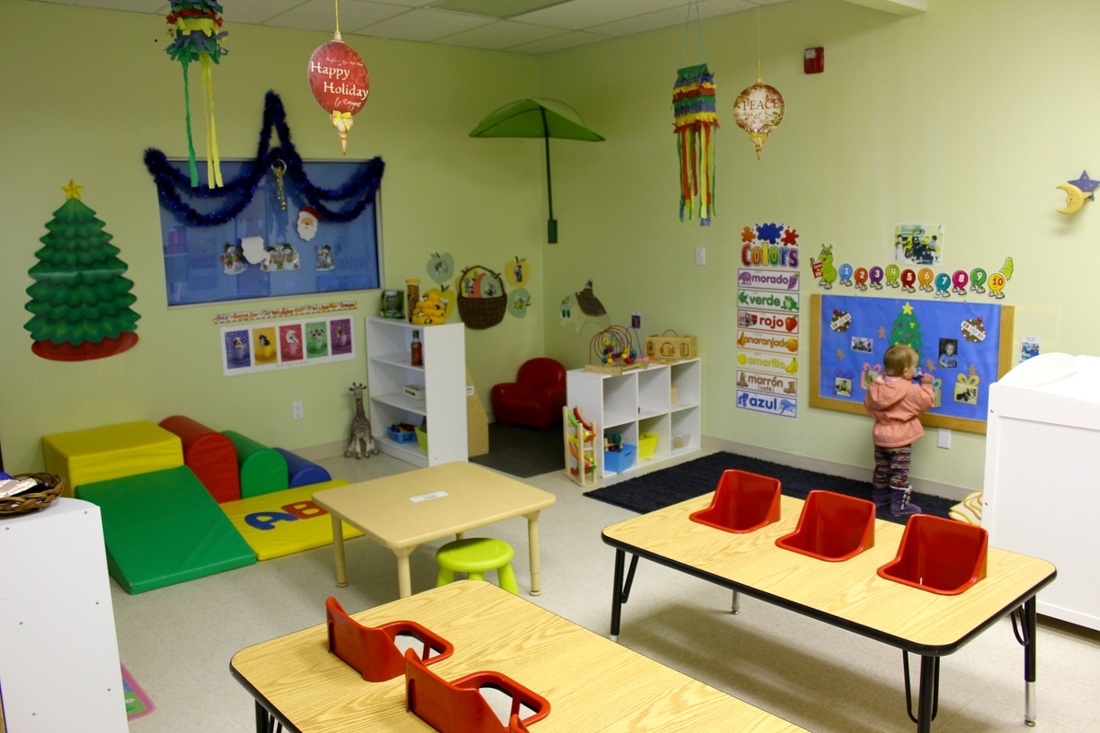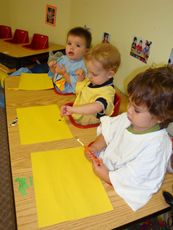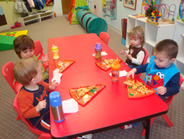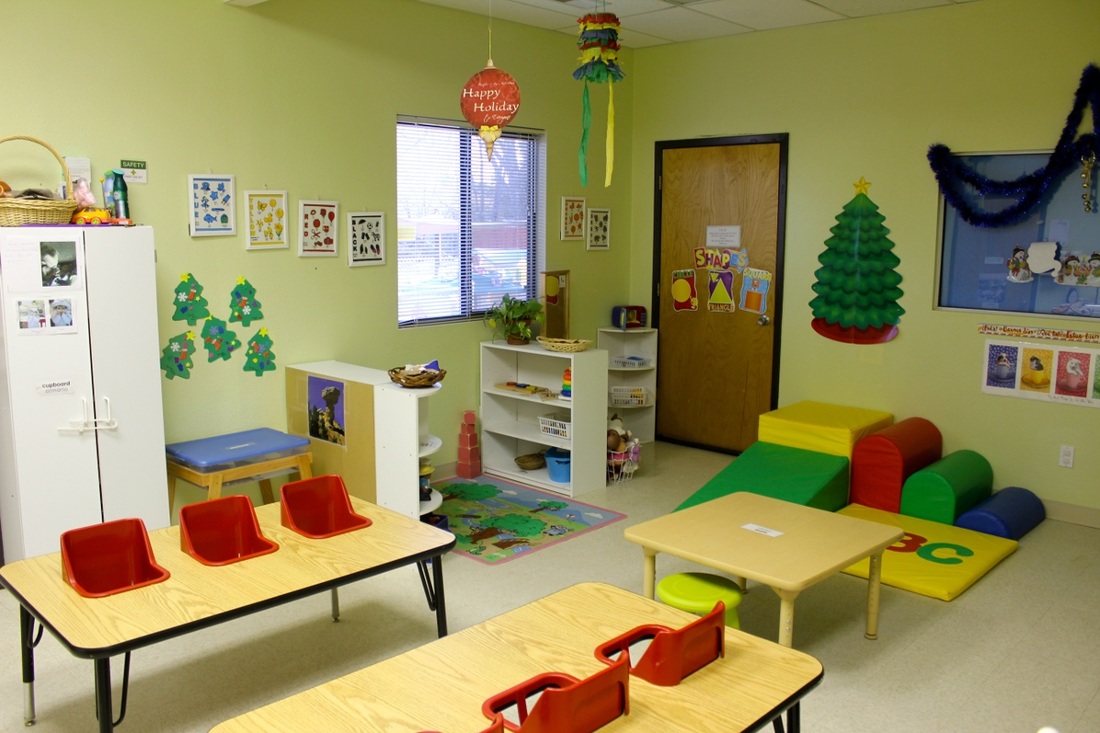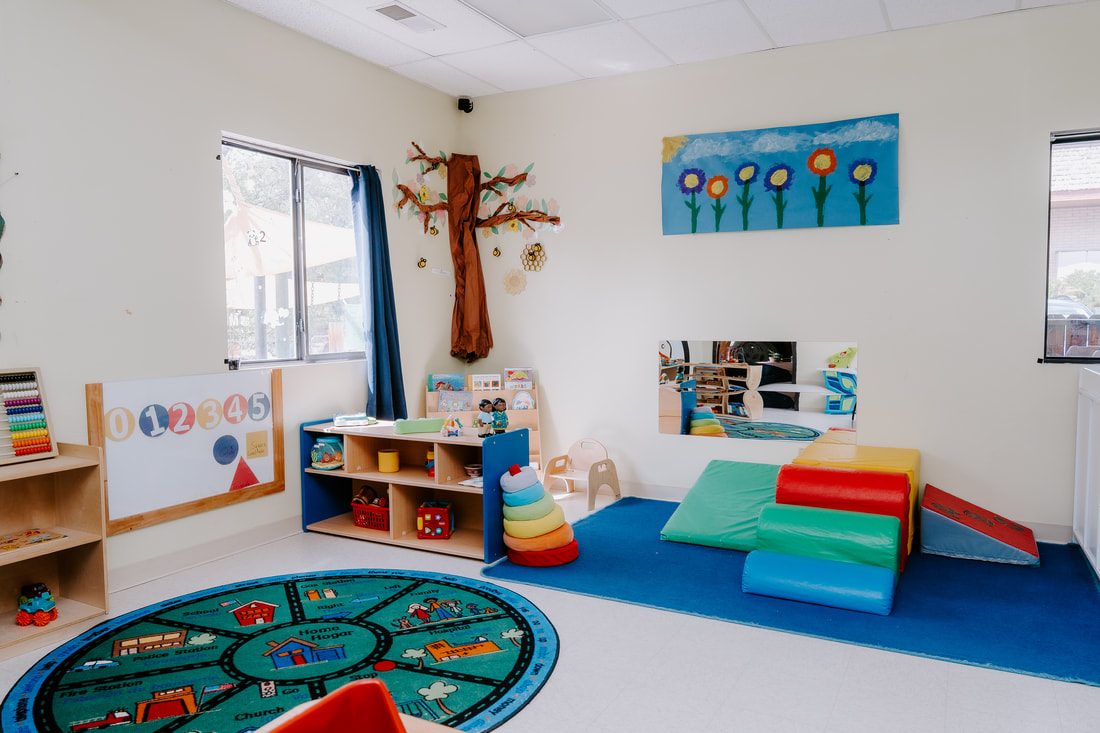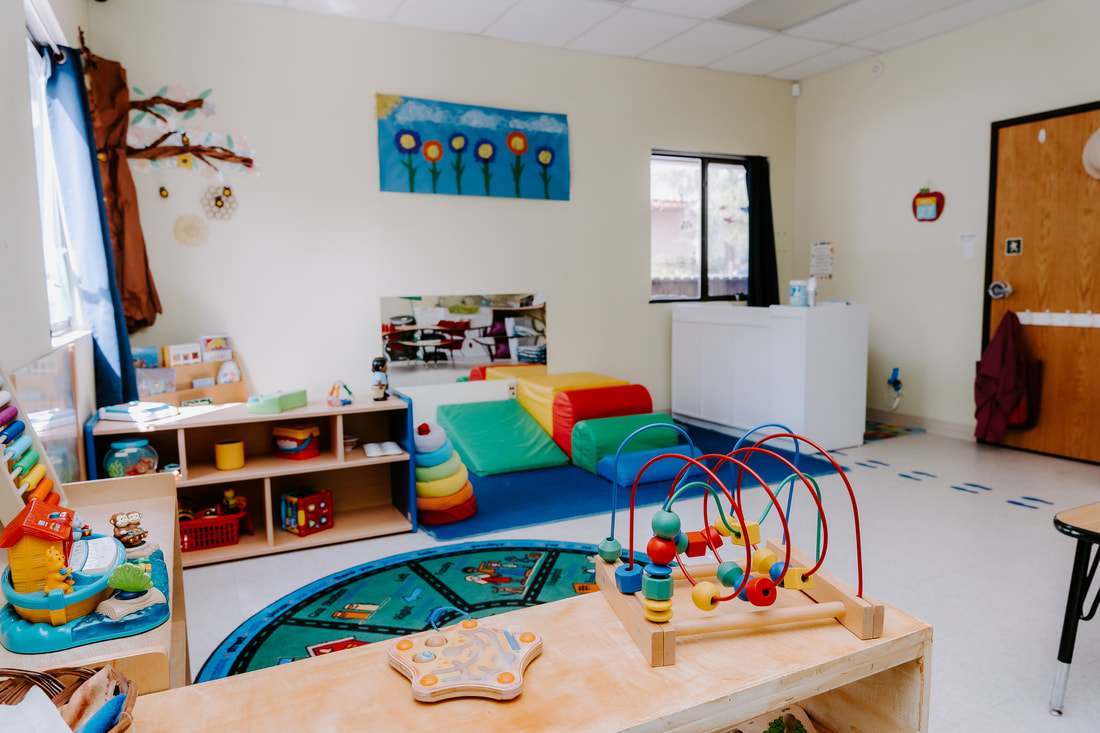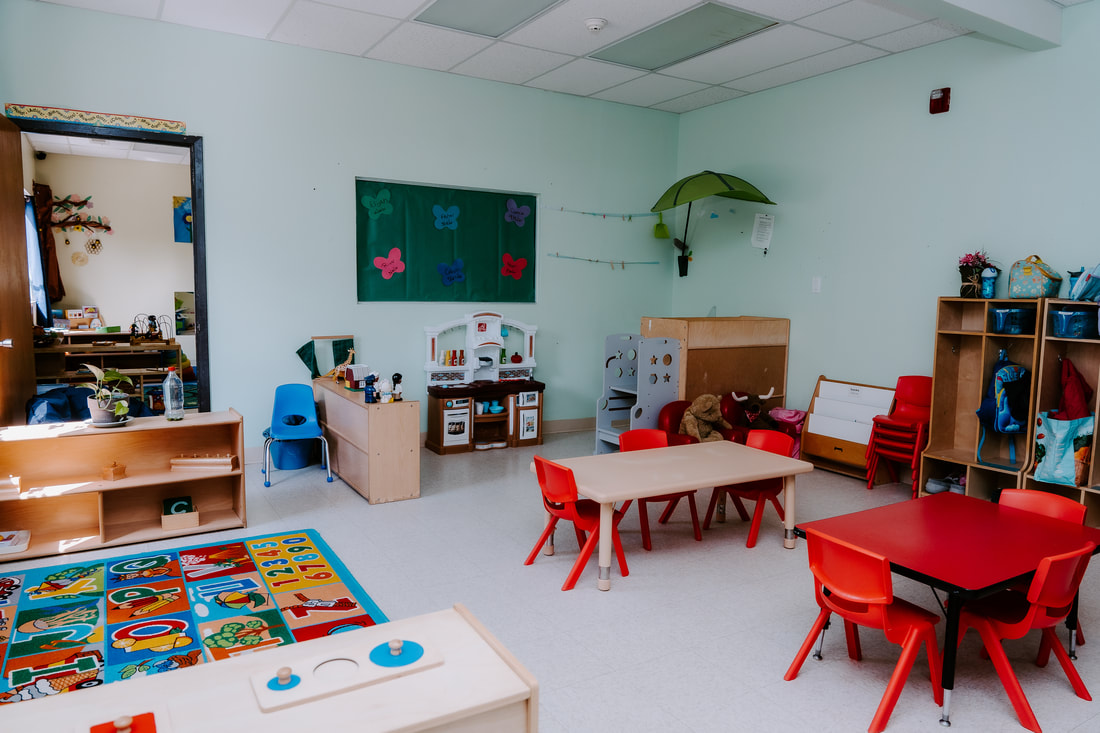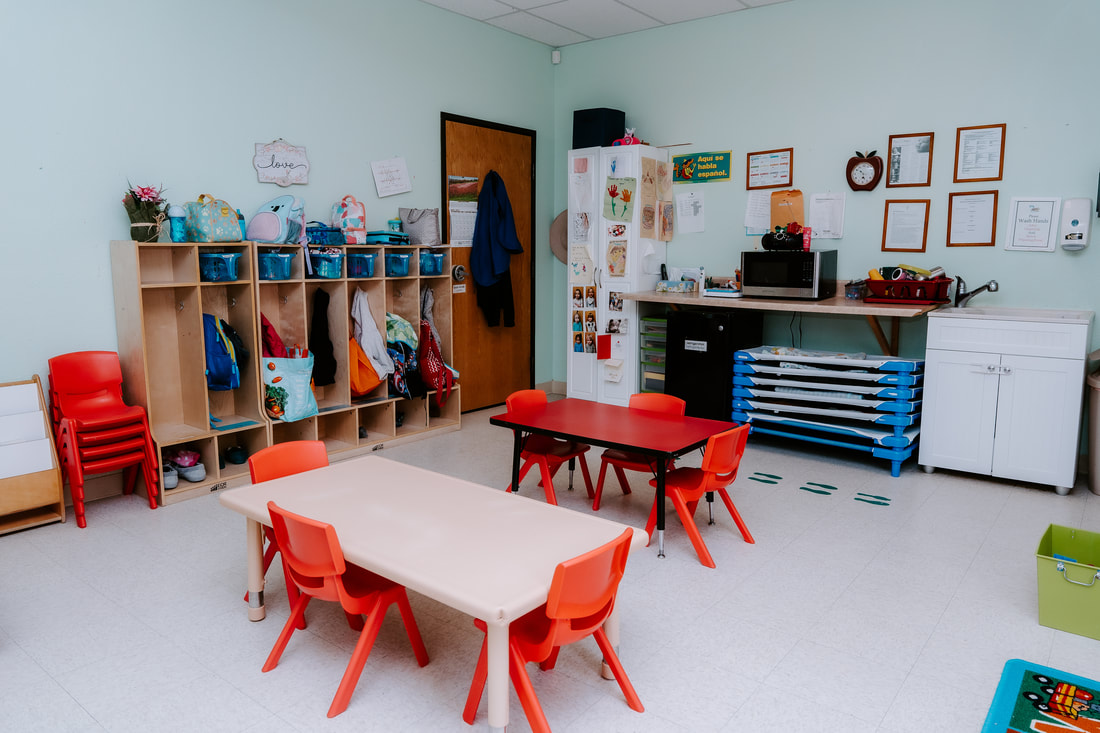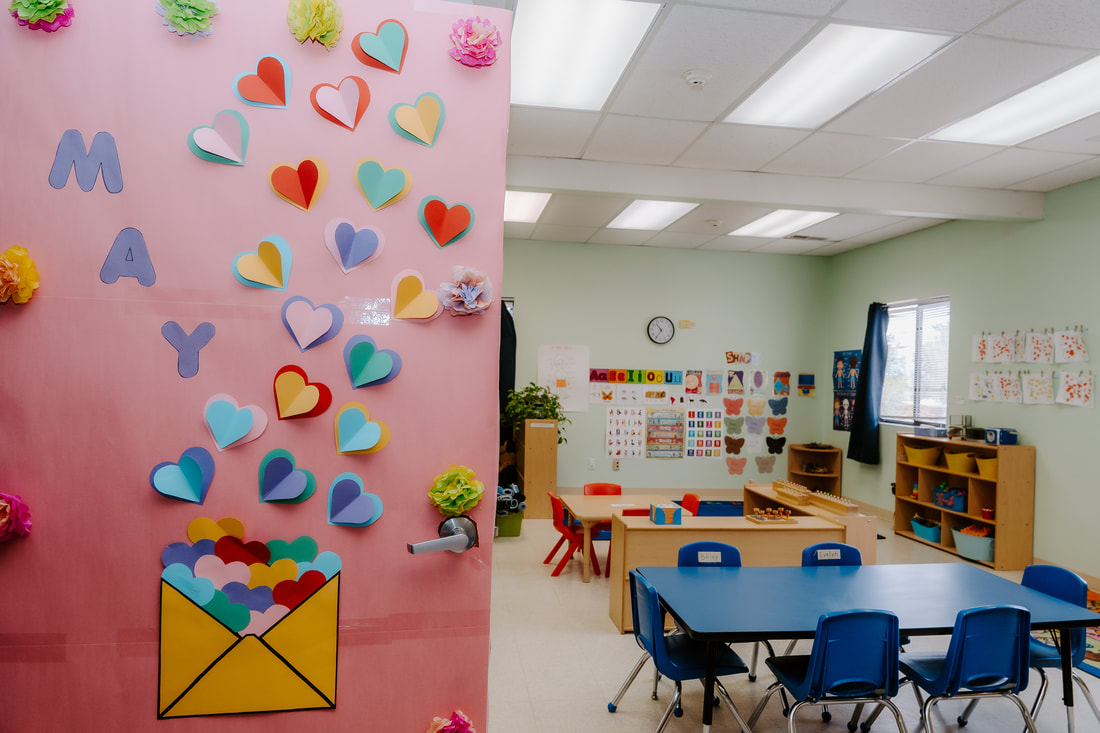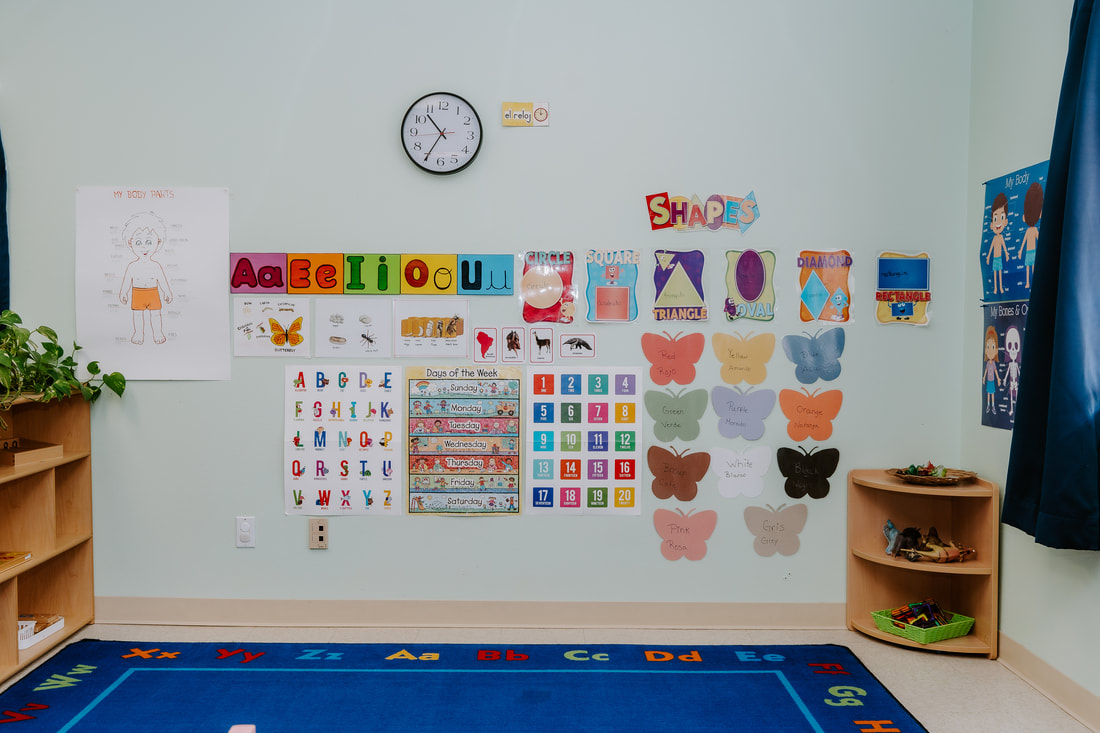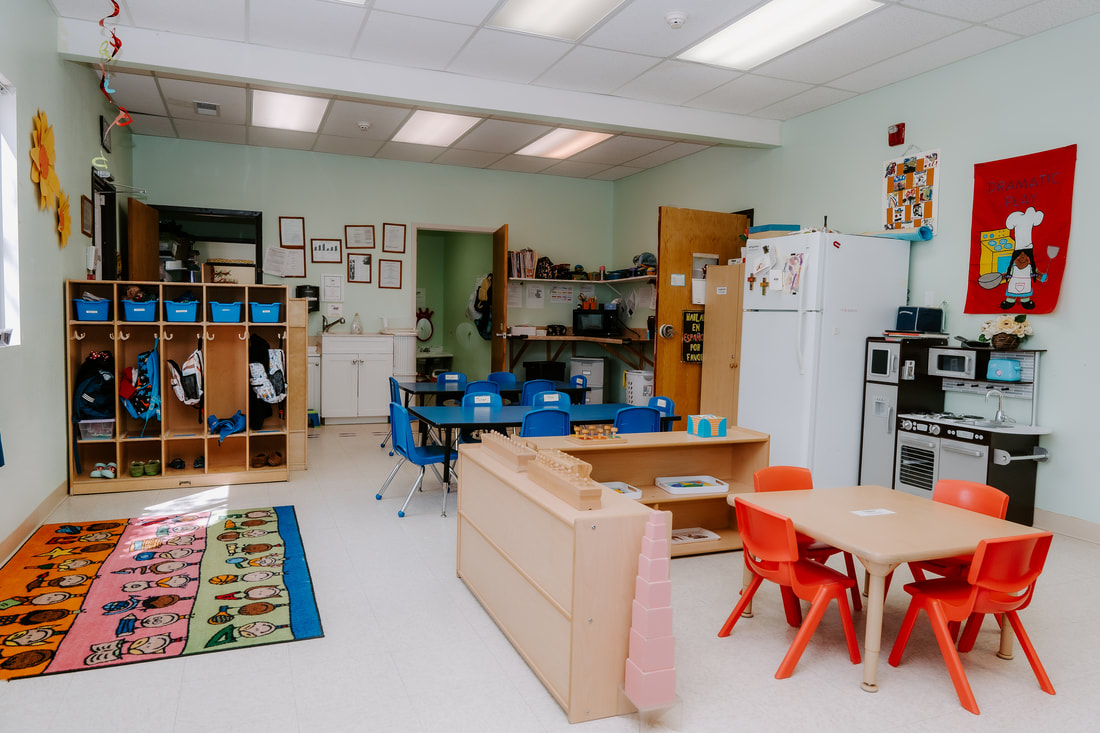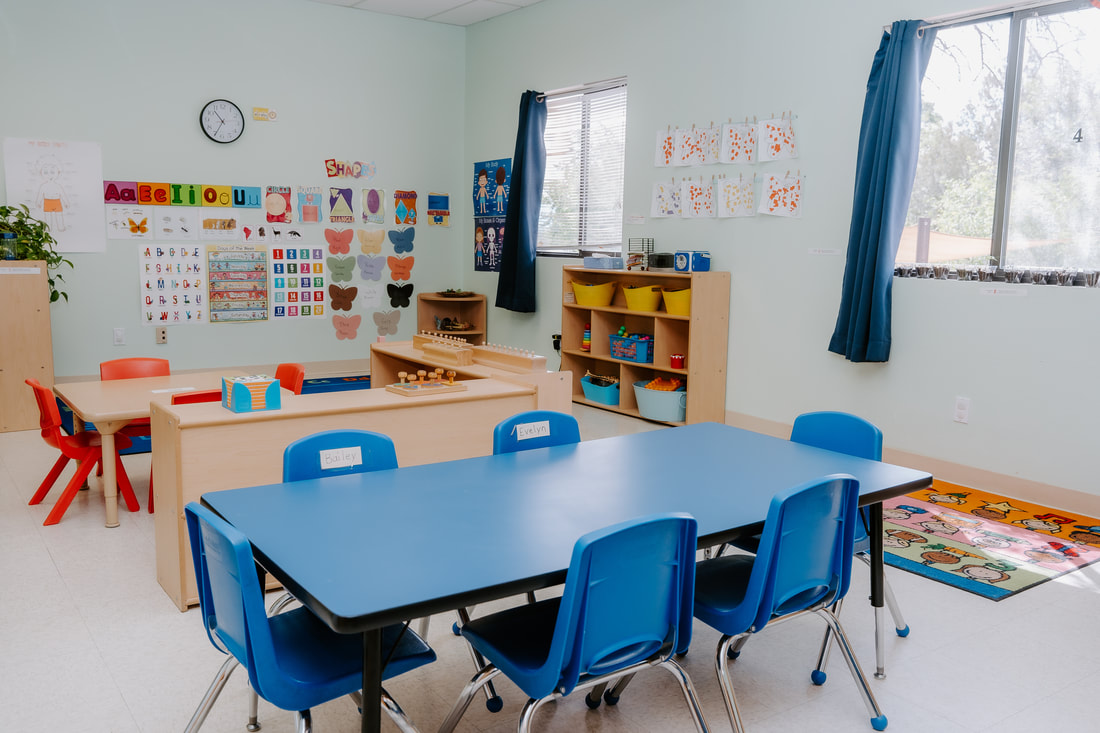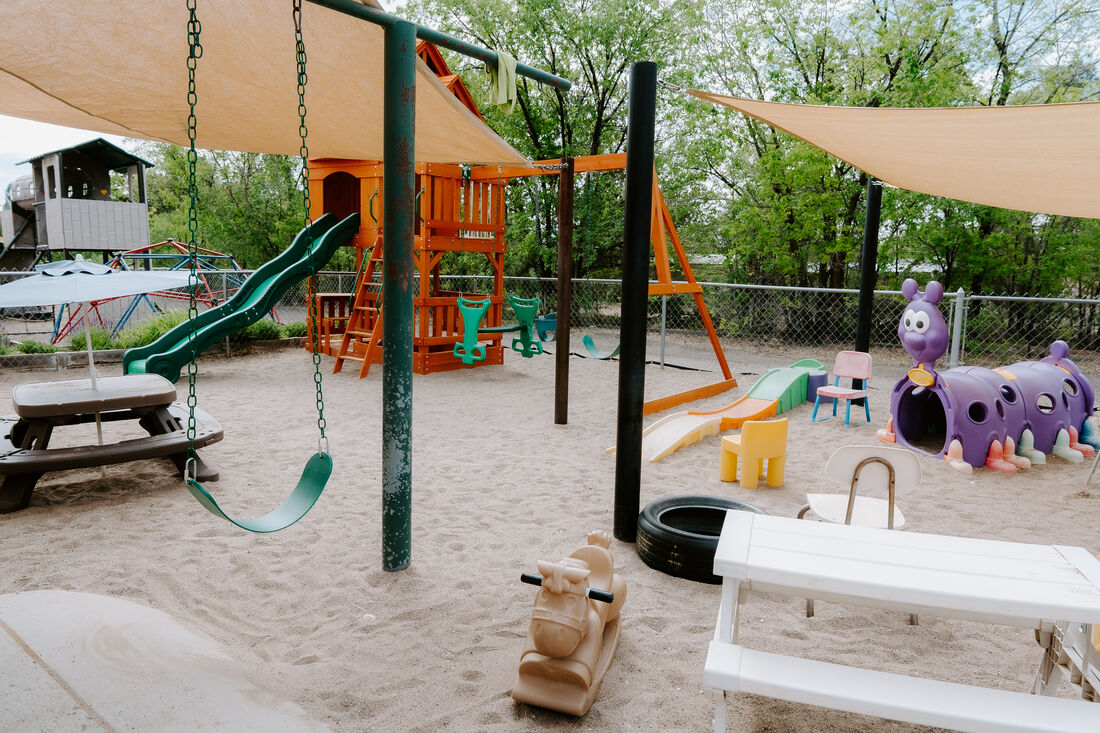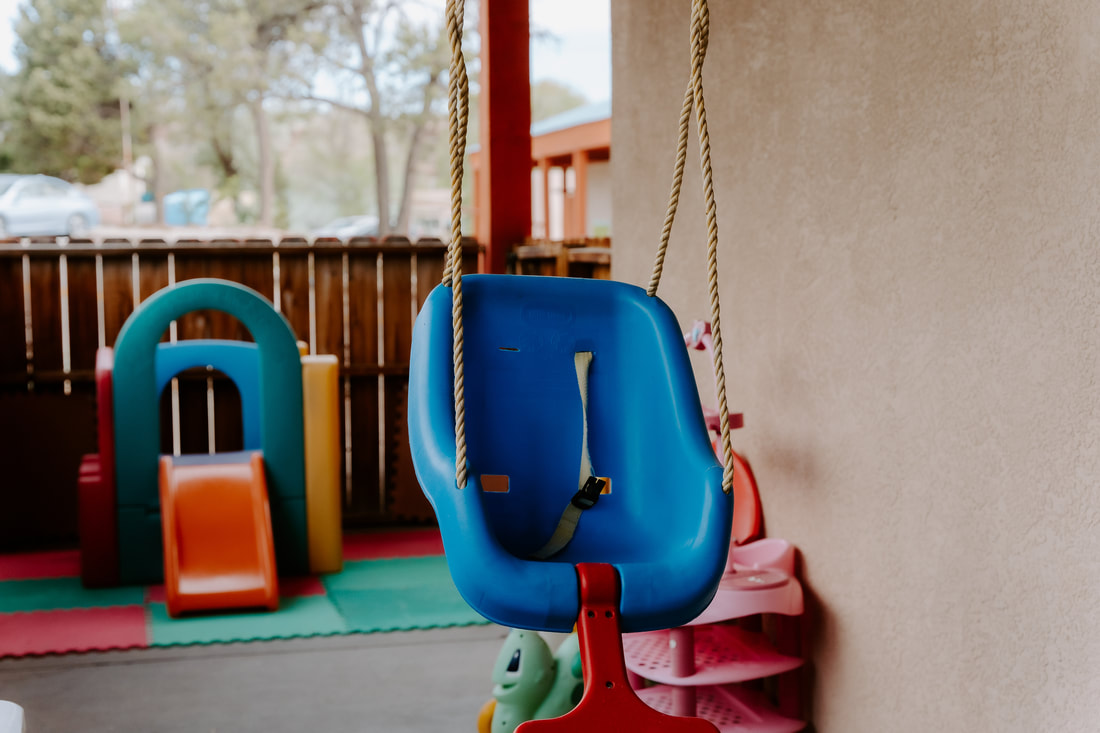The Montessori curriculum looks at the toddler as a child between 12 months and 36 months. It is a period characterized by the need to explore everything, move, and develop large motor coordination and strength. We believe at this age there is huge expansion into language. They develop a capacity to create symbols, images, and concepts and become aware of him/herself as a separate and independent person.
|
Curriculum
The BMS curriculum has five main areas at the toddler level:
The Toddler program takes advantage of the toddler’s natural drive to act independently. We help them learn to care for themselves including washing hands, putting on jackets, putting on shoes, and feeding themselves. In this language-rich environment, teachers support and guide toddlers as they explore order and disorder, and refine their emerging motor skills. Outdoor play is part of the daily routine. Toddler exercises and activities recognize that children learn by doing. Classroom materials are always accessible, attractive, safe, and geared for a child’s success. Activities are changed regularly in response to children's need for variety and challenge as they grow and learn. The safe, loving, gentle atmosphere puts children and parents at ease and makes for a trusting, spontaneous transition to school. |
Skills learned:
Social
Emotional
Physical
Intellectual
|
The Environment
The toddler needs a self-contained environment prepared just for him/her. They will learn to take care of all their own needs in their classroom. They need the facility to toilet train, prepare their own meals and snacks, hang up their own cloths and dress and undress themselves. They need a space for movement and larger motor activities and a quieter space for manipulative, language and more concentration work. One of the major differences in a Montessori toddler class is that the children are free to move around at will, carry objects, walk as a group, climb and take long walks outside.
-- We have surveillance cameras in the main building and the Toddler 1 room --
The Teacher’s Role
The teacher of a Montessori toddler needs to be very familiar with the stages of development for this age group. They have an extensive list of activities and developmentally appropriate educational materials. Each material must isolate one concept or skill at a time.She then must carefully prepare the environment, observe the child and then guide her based on her observations. We cannot know the needs of the child unless we are constantly observing. We cannot prepare the environment unless we know the needs of the child. This is the fundamental role of the teacher - prepare the environment and observe the child - non-directive guidance.
Growing children
While at BMS, teachers will be promoting the real life skills of dressing and undressing, grooming and toilet learning, carrying things, cleaning, grace and courtesy. Your toddler will be learning sense awareness (learning about dimensions, shapes, colors, textures, sounds, tastes, smells) and primary language development by connecting their observations and sense training. There will be stories, singing, talking and special materials to help teach abstract vocabulary.
Art is skills based and the children can freely choose cutting, gluing, painting, magic makers, or clay. We listen to music of all varieties to help children develop an ear for music as well as give more formal instruction on rhymes, moving to music and practicing duplicating rhythms.
Frequently Asked Questions:
WHAT TO EXPECT IN THE FIRST DAYS
Starting school is a major change in a young person's life. Some children adjust more easily than others.
Most children that come to Montessori are eager, alert, independent children that come into the classroom and immediately begin taking advantage of the materials offered. Dependent children who are encouraged to go about on their own, need time to adjust and to become independent. A child who has been the center of attention and suddenly becomes one of the group, needs time to discover his own abilities and the satisfaction that comes from individual accomplishments.
The parent's attitude toward school is of great importance during the first weeks. If you ask your child, "Do you like school?" or "Do you want to go to school?” you are implying that perhaps there is some reason he shouldn't like school or that perhaps there is some reason he shouldn’t want to go to school. Besides, he will be sure to tell you if his feelings are negative, but let it be his own idea, and not yours. If for some reason you are concerned, please call the Director and discuss the situation with her, but please try to show only positive attitudes to your child.
If your child enjoys himself and does well during school, then you should not be too concerned if he is reluctant to go into the school. Sometimes separation problems are caused by parent-child or sibling relationships and have nothing to do with school itself.
Please be reassured your child will be nurtured, guided and loved by an experienced teacher.
Our unique environment is effective and fun. It combines two powerful elements in early childhood education: the Montessori method and bilingual language instruction featuring Spanish, a key language nationally and internationally.
The curriculum incorporates group activities to reinforce the fun of Spanish language in song, movement and games. BMS provides a safe and caring environment during working hours on which parent can rely.
Bilingual Montessori School (BMS) aims to prepare its students to excel as young leaders of tomorrow by combining an exclusive curriculum based on both Montessori and bilingual education, tailored specifically for children, with enhanced first class childcare services. What set BMS apart from the competition are its bilingual education program, after-school classes, and activities such as arts and crafts, dance, and gymnastics, all in one location.
BMS follows the teachings and principles of Maria Montessori through well-prepared environments that meet the needs and challenges of all children.
Most children that come to Montessori are eager, alert, independent children that come into the classroom and immediately begin taking advantage of the materials offered. Dependent children who are encouraged to go about on their own, need time to adjust and to become independent. A child who has been the center of attention and suddenly becomes one of the group, needs time to discover his own abilities and the satisfaction that comes from individual accomplishments.
The parent's attitude toward school is of great importance during the first weeks. If you ask your child, "Do you like school?" or "Do you want to go to school?” you are implying that perhaps there is some reason he shouldn't like school or that perhaps there is some reason he shouldn’t want to go to school. Besides, he will be sure to tell you if his feelings are negative, but let it be his own idea, and not yours. If for some reason you are concerned, please call the Director and discuss the situation with her, but please try to show only positive attitudes to your child.
If your child enjoys himself and does well during school, then you should not be too concerned if he is reluctant to go into the school. Sometimes separation problems are caused by parent-child or sibling relationships and have nothing to do with school itself.
Please be reassured your child will be nurtured, guided and loved by an experienced teacher.
Our unique environment is effective and fun. It combines two powerful elements in early childhood education: the Montessori method and bilingual language instruction featuring Spanish, a key language nationally and internationally.
The curriculum incorporates group activities to reinforce the fun of Spanish language in song, movement and games. BMS provides a safe and caring environment during working hours on which parent can rely.
Bilingual Montessori School (BMS) aims to prepare its students to excel as young leaders of tomorrow by combining an exclusive curriculum based on both Montessori and bilingual education, tailored specifically for children, with enhanced first class childcare services. What set BMS apart from the competition are its bilingual education program, after-school classes, and activities such as arts and crafts, dance, and gymnastics, all in one location.
BMS follows the teachings and principles of Maria Montessori through well-prepared environments that meet the needs and challenges of all children.
IS MY CHILD TOO SICK FOR SCHOOL?
Keep a Sick Child at Home if You See the Following:
Fever. This is one symptom that automatically rules out school, no questions. (Anywhere from 100 to 101 degrees or higher is the usual guideline used by most schools.) Your sick child should be fever-free without medication for at least 24 hours before you send them back to school.
Diarrhea. This could be a sign of a viral infection, so it’s best to keep your child at home. It’s also important to keep rehydrating them with an oral rehydrating solution when they have diarrhea, and the best way to do that is by keeping them at home.
Vomiting. Aside from the fact that your child won’t be comfortable, they could vomit again (in our house, one bout of vomiting is usually followed by another). Keep them home until they have gone 24 hours without throwing up -- though some parents and doctors say it’s fine to send a child to school if they haven’t vomited since the night before.
Cough. This depends on how severe the cough is. Coughs can spread infection to other students. A serious cough can also keep a child from getting a good night’s rest, which means they'll be too tired for school in the morning. As a general rule, if your child has a serious cough, particularly if it’s accompanied by breathing troubles, call your doctor and keep them home. But if it’s just a mild cough and they have no other symptoms, they can probably go to school.
Rashes. Skin rashes could be a sign of a contagious infection, such as impetigo. You should have a rash evaluated by a doctor before sending your child to school.
Pinkeye (conjunctivitis). This infection can quickly and easily spread from one child to another, as many parents of grade-school age children already know all too well. Keep your child home until the doctor says they are no longer contagious.
Send Your Child to School if You See the Following:
Stomachache. This one can be tough to call. If they don’t have diarrhea and aren’t constipated, tummy trouble could be caused by any number of things from anxiety to food poisoning. If the stomach pains seem minor and they have no other symptoms, send them to school. Later, you can talk to them about any emotional issues that may be on their mind.
Ear infection. As with coughs, you should evaluate all their symptoms before making the call. If they have mild ear pain, they’ll likely be fine; but if they are clearly uncomfortable, they will have trouble concentrating in class anyway and should be kept at home. And if there are any other accompanying symptoms such as a fever, it’s a definite sick day.
Runny nose. Let’s be realistic: If you kept your child home every time they had the sniffles, they’d miss a lot of school. Use your judgment. If they have a runny nose but seem fine otherwise, then it’s probably okay for them to go to school.
The bottom line: Trust your instincts. If your child seems lethargic and just not themselves (if they're not interested in playing, that is often a big clue), keep them home and monitor them for any signs of illness.
Thank you for your cooperation.
Healthy kids = Healthy Teachers = Happy School
Fever. This is one symptom that automatically rules out school, no questions. (Anywhere from 100 to 101 degrees or higher is the usual guideline used by most schools.) Your sick child should be fever-free without medication for at least 24 hours before you send them back to school.
Diarrhea. This could be a sign of a viral infection, so it’s best to keep your child at home. It’s also important to keep rehydrating them with an oral rehydrating solution when they have diarrhea, and the best way to do that is by keeping them at home.
Vomiting. Aside from the fact that your child won’t be comfortable, they could vomit again (in our house, one bout of vomiting is usually followed by another). Keep them home until they have gone 24 hours without throwing up -- though some parents and doctors say it’s fine to send a child to school if they haven’t vomited since the night before.
Cough. This depends on how severe the cough is. Coughs can spread infection to other students. A serious cough can also keep a child from getting a good night’s rest, which means they'll be too tired for school in the morning. As a general rule, if your child has a serious cough, particularly if it’s accompanied by breathing troubles, call your doctor and keep them home. But if it’s just a mild cough and they have no other symptoms, they can probably go to school.
Rashes. Skin rashes could be a sign of a contagious infection, such as impetigo. You should have a rash evaluated by a doctor before sending your child to school.
Pinkeye (conjunctivitis). This infection can quickly and easily spread from one child to another, as many parents of grade-school age children already know all too well. Keep your child home until the doctor says they are no longer contagious.
Send Your Child to School if You See the Following:
Stomachache. This one can be tough to call. If they don’t have diarrhea and aren’t constipated, tummy trouble could be caused by any number of things from anxiety to food poisoning. If the stomach pains seem minor and they have no other symptoms, send them to school. Later, you can talk to them about any emotional issues that may be on their mind.
Ear infection. As with coughs, you should evaluate all their symptoms before making the call. If they have mild ear pain, they’ll likely be fine; but if they are clearly uncomfortable, they will have trouble concentrating in class anyway and should be kept at home. And if there are any other accompanying symptoms such as a fever, it’s a definite sick day.
Runny nose. Let’s be realistic: If you kept your child home every time they had the sniffles, they’d miss a lot of school. Use your judgment. If they have a runny nose but seem fine otherwise, then it’s probably okay for them to go to school.
The bottom line: Trust your instincts. If your child seems lethargic and just not themselves (if they're not interested in playing, that is often a big clue), keep them home and monitor them for any signs of illness.
Thank you for your cooperation.
Healthy kids = Healthy Teachers = Happy School
What KIND OF SNACKS SHOULD I PACK?
BMS is a nut free school - please do not send snacks with nut products
Pumpernickel bread and a tangerine
Whole grain cereal Bran muffin
Whole-wheat bagel and orange slices
Oatmeal cookie and a plum
Corn muffin
Cinnamon rice cake and a peach
Tortilla and refried beans
Whole wheat bread and a sliced tomato
Trail mix Waffle squares and strawberries
Rye wafers and cream cheese
Graham crackers and a pear
Cucumber, carrot, and cottage cheese
Whole-wheat raisin toast
Rice cakes and cream cheese
Whole-wheat pita bread and almond
Cut up vegetables with ranch dressing
Hummus, whole-wheat pita bread, or whole-wheat pita crackers
String cheese and celery
Ginger snaps and applesauce
Cottage cheese with crushed pineapple
Whole wheat bread sticks and string cheese
Yogurt and fruit
Whole-wheat crackers and vegetable sticks
Granola and a baked apple
Banana bread
Pumpernickel bread and a tangerine
Whole grain cereal Bran muffin
Whole-wheat bagel and orange slices
Oatmeal cookie and a plum
Corn muffin
Cinnamon rice cake and a peach
Tortilla and refried beans
Whole wheat bread and a sliced tomato
Trail mix Waffle squares and strawberries
Rye wafers and cream cheese
Graham crackers and a pear
Cucumber, carrot, and cottage cheese
Whole-wheat raisin toast
Rice cakes and cream cheese
Whole-wheat pita bread and almond
Cut up vegetables with ranch dressing
Hummus, whole-wheat pita bread, or whole-wheat pita crackers
String cheese and celery
Ginger snaps and applesauce
Cottage cheese with crushed pineapple
Whole wheat bread sticks and string cheese
Yogurt and fruit
Whole-wheat crackers and vegetable sticks
Granola and a baked apple
Banana bread
Is THERE ENOUGH SPACE FOR MY CHILD?
If there is space available, your child will be assigned to a classroom. Children currently enrolled and their siblings are given admission preference. Consideration is also given to the age balance of the class when admitting new children. If there is no space available at the time of enrollment, you can ask to be put on the waiting list.
WHAT IS MONTESSORI TEACHING?
A basic idea in the Montessori education philosophy is that in order to develop physical, intellectual, and spiritual potential to the fullest, the child must have freedom: a freedom to be achieved through self-discipline, order, and clearly defined limits. We rely on Dr. Montessori’s insight that the only valid impulse to learning is the self-motivation of the child. Click here to learn more.
WHY SHOULD MY CHILD LEARN SPANISH?
According to the US Census, 1 in 5 US residents speak a foreign language at home, even though most speak English well. Spanish is overwhelmingly the non-English language spoken in the US. BMS provides a unique window into this language and its cultures. Class sizes are limited to enhance dialogue, improve retention, and are taught by native Spanish-speaking degreed teachers who are fluent in English. Click here to learn more.
ARE YOU OPEN ALL YEAR ROUND?
As fall turns into winter, we can anticipate some days when the weather will be a challenge either because of ice or snow or both. In an average winter, there will be days that we either start school late, or, in some cases, even cancel school for the entire day.
We follow the Los Alamos Public Schools schedule for delays or closures. We do have a 1 day closure at the end of Academic and Summer programs
To find out if there is a snow delay or cancellation, call LAPS at 663-2223 or visit their website.
We follow the Los Alamos Public Schools schedule for delays or closures. We do have a 1 day closure at the end of Academic and Summer programs
To find out if there is a snow delay or cancellation, call LAPS at 663-2223 or visit their website.
DO YOU OFFER DISCOUNTS?
In honor of our son, a U.S Marine, we are giving a 10% discount on the lowest tuition (extended care not included) to all ACTIVE military, police officers & firefighters.
Second child in attendance at BMS receives 10% off discount on tuition (extended care not included). Valid when two children are currently enrolled.
Second child in attendance at BMS receives 10% off discount on tuition (extended care not included). Valid when two children are currently enrolled.
